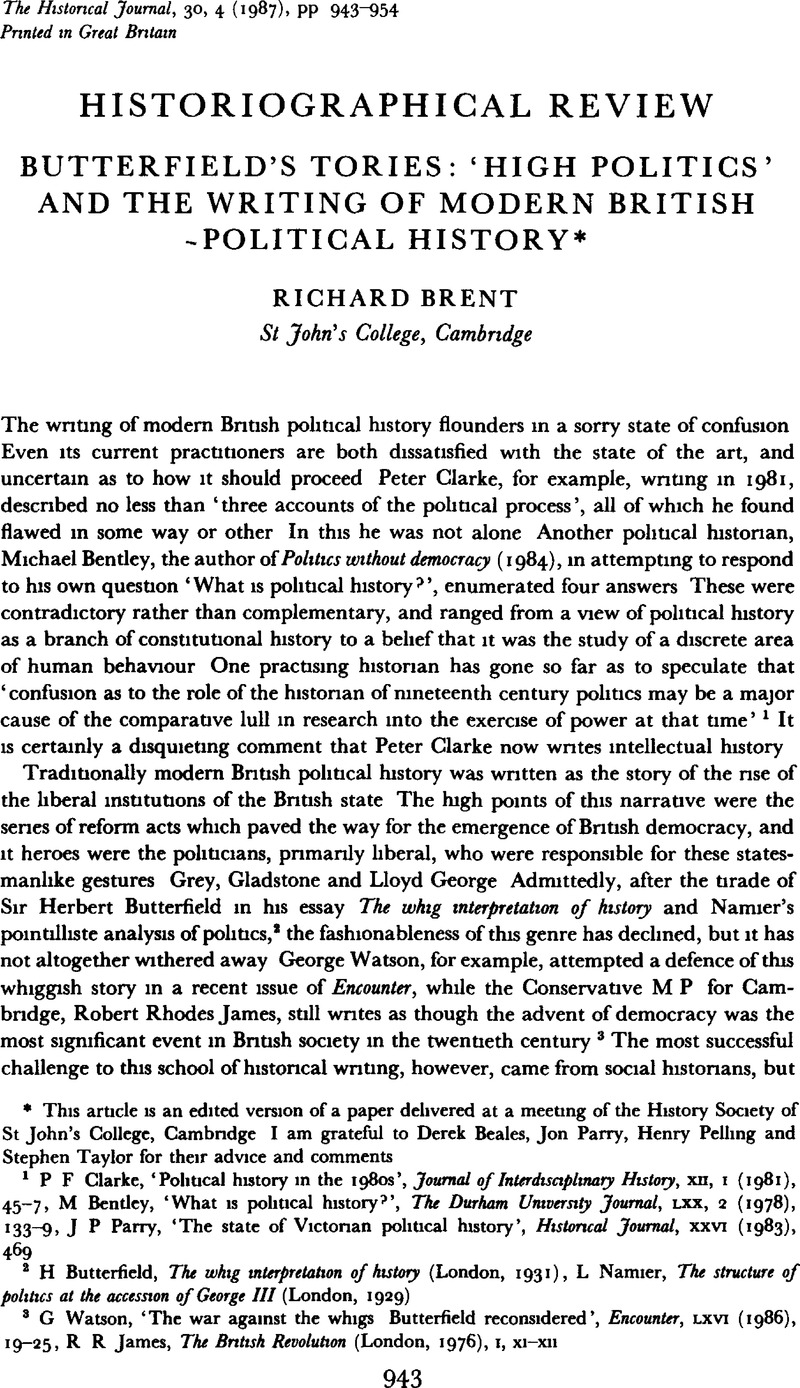Article contents
Butterfield's Tories: ‘High Politics’ and the Writing of Modern British Political History*
Published online by Cambridge University Press: 11 February 2009
Abstract

- Type
- Historiographical Review
- Information
- Copyright
- Copyright © Cambridge University Press 1987
References
2 Butterfield, H, The whig interpretation of history (London, 1931)Google Scholar, Namier, L, The structure of politics at the accession of George III (London, 1929)Google Scholar
3 Watson, G, ‘The war against the whigs Butterfield reconsidered’, Encounter, LXVI (1986), 19–25Google Scholar, James, R R, The British Revolution (London, 1976), I, XI–XIIGoogle Scholar
4 By this I mean the operation of the system and institutions of political representation: elections, parliament, executive and monarchy.
5 See Moore, D. C., The politics of deference (Hassocks, 1976), p. 419Google Scholar; Cannon, J., Parliamentary reform 1640–1832 (Cambridge, 1973), p. 250Google Scholar.
6 Jones, G. Stedman, Languages of class (Cambridge, 1983)Google Scholar.
7 McKibbin, R., The evolution of the Labour party 1910–1924 (Oxford, 1974), p. 112Google Scholarn.
8 See Clarke, P. F., ‘Political history in the 1980s’, Journal of Interdisciplinary History, XII, I (1981), 47Google Scholar; idem, ‘The impotence of being earnest’, Times Literary Supplement, 14 Mar. 1986, p. 271.
9 Cowling, M J, 1867 Disraeli, Gladstone and revolution (Cambridge, 1967)CrossRefGoogle Scholar, idem, The impact of Labour (Cambridge, 1971), idem, The impact of Hitler (Cambridge, 1975), Cooke, A B and Vincent, J R, The governing passion (Brighton, 1974)Google Scholar, Jones, A, The politics of reform 1884 (Cambridge, 1972)Google Scholar, Bentley, M, The liberal mind 1914–29 (Cambridge, 1977)CrossRefGoogle Scholar, Clark, J C D, The dynamics of change (Cambridge, 1982)CrossRefGoogle Scholar
10 Cowling, M J, The nature and limits of political science (Cambridge, 1963), p 87Google Scholar
11 The Economist, 22 July 1967, p 329, Times Literary Supplement, 25 July, 1975, p 839
12 See Letwin, S R, ‘The Christian decline’, The Listener, 115 (01 1986), 30Google Scholar
13 Bentley, M and Stevenson, J, eds, High and low politics in modern Britain (Oxford, 1983), p 2Google Scholar
15 Jones, A., ‘Where “Governing is the use of words”’, Historical Journal, XIX (1976), 253–4Google Scholar.
16 Cowling, , 1867, p. 3Google Scholar; Cooke, and Vincent, , The governing passion, p. 3Google Scholar.
17 Cooke, and Vincent, , The governing passion, p. xiGoogle Scholar.
18 Cowling, , 1867, p 1Google Scholar
19 Ibid p 3
20 Cooke, and Vincent, , The governing passion, p 10Google Scholar
21 Cowling, , The impact of Labour, pp 3–4Google Scholar
22 Ibid p 4
23 Ibid
24 Cooke, and Vincent, , The governing passion, pp 21–2Google Scholar, Cowling, , The impact of Labour, p 10Google Scholar
25 Foster, R. F., Lord Randolph Churchill (Oxford, 1981), p. 6Google Scholar; Cooke, and Vincent, , The governing passion, p. 10Google Scholar.
26 Cowling, , The impact of Labour, p. 5Google Scholar.
27 Idem, 1867, p. 3.
28 E.g. Pelling, H., Cambridge Review, XCII (1970–1971), 180–1Google Scholar.
29 Cowling, , The impact of Labour, pp. 7–8Google Scholar.
30 For Burke, see Clark, J. C. D., English Society 1688–1832 (Cambridge, 1985), pp. 247–58Google Scholar, for Salisbury and Baldwin, see Jones, A. and Bentley, M., ‘Salisbury and Baldwin’, Cowling, M.J., ed., Conservative essays (London, 1978–9), pp. 25–40Google Scholar, Cowling, M.J., Religion and public doctrine in modern Britain (Cambridge, 1980), pp. 361–87CrossRefGoogle Scholar and idem, The impact of Labour, passim.
31 Cooke, and Vincent, , The governing passion, p XIIGoogle Scholar
32 Himmelfarb, G, American Historical Review, LXXIII, 1 (02, 1968), 822Google Scholar
33 Collini, S, Winch, D and Burrow, J, That noble science of politics (Cambridge, 1983), pp 348–50CrossRefGoogle Scholar
34 Cowling, , The nature and limits of political science, p 1Google Scholar
35 Ibid p 210
36 Oakeshott, M., ‘The study of “politics” in a university’, in Rationalism in politics (London, 1962), pp. 301–33Google Scholar.
37 Cowling, , Religion and public doctrine in modern England, p. xxiiGoogle Scholar.
38 Oakeshott, M., ‘Rationalism in polities’, in Rationalism in politics (London, 1962), pp. 7–13, 14–17Google Scholar and passim. See also Oakeshott, M., ‘Scientific polities’, The Cambridge Journal, I (1947–1948), 350Google Scholar.
39 Cowling, , The nature and limits of political science, p. 121Google Scholar.
40 Ibid. p. 22.
41 Ibid. p. 178
42 Idid. p. 20–22.
43 Cooke, and Vincent, , The governing passion, p. 167Google Scholar
44 Ibid. p. 166.
45 Cowling, , The nature and limits of political science, p 152Google Scholar
46 Ibid p 185
48 Idem, The impact of Labour, p 6
49 Ibid
50 Foster, , Lord Randolph Churchill, p. 5Google Scholar.
51 Cowling, , 1867, p. 311Google Scholar.
53 Ibid.
54 Idem, 1867, p. 339.
55 Cowling, , The nature and limits of political science, p. 184Google Scholar.
- 5
- Cited by




